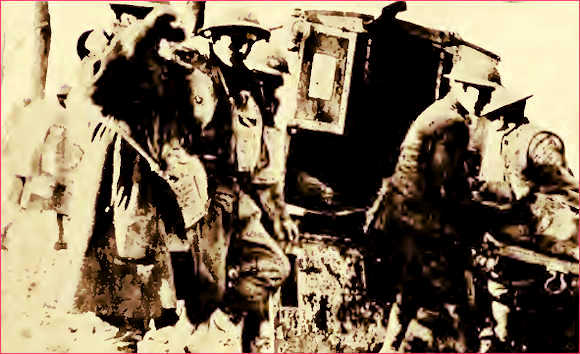Harry Parkin (1880–1946) was born into a well-to-do Pittsburgh family. He was a product of the prewar Plattsburgh training camp as well as the April 1917 Fort Niagara Officers Training Camp. Commissioned a captain, Parkin commanded a company and then a battalion of the 316th Infantry Regiment, part of the National Army’s 79th Division. He rose to the rank of major and was in temporary command of the regiment for a short time during the Meuse-Argonne Offensive.
Severely wounded in action and captured by the Germans on 4 November 1918, Parkin, who earned the Distinguished Service Cross for his actions on that day, survived the war and captivity and wrote this excellent memoir describing his service. His citation reads in part:
. . For extraordinary heroism in action at Hill 378, the Borne du Cornouiller, France, November 4, 1918, while in command of one of the assaulting battalions of the 316th Infantry. Leading the attack, Major Parkin received four wounds from enemy machine-gun fire, but declined to be evacuated, remaining with his command in the position he had captured, temporarily assigning active command of his battalion to his senior captain. Later, learning that his officer had been killed, Major Parkin, despite intense suffering from his wounds, again assumed active command, and under a terrific enemy concentration of artillery and machine-gun fire, defended the position with great bravery and gallantry against counterattacks by vastly superior numbers of the enemy forces.
 |
| Wounded Men of the 316th Infantry at Hill 378 |
Editors Steven Trout and Ian Isherwood are historians who specialize in war and memory. They have provided an excellent service in editing and presenting this memoir. Their introduction is helpful, and their annotations are sufficient to explain, when necessary, without unduly interrupting Parkin’s narrative. Serpents of War proceeds chronologically with Parkin describing his actions and his struggles throughout his service. He recounts his experiences with his fellow regimental officers in such mundane affairs as lengthy marches and the search of adequate quarters. The highlight of the narrative is Parkin’s description of his regiment’s participation in the Meuse-Argonne Offensive. During the opening of the battle, the 79th Division, which was completely new to the front line, was assigned probably the most difficult task of any American Expeditionary Forces (AEF) unit on the first day, that of taking Montfaucon, a heavily fortified position.
Parkin’s description of his regiment’s marching and fighting are vivid. He makes the reader understand and feel the exhaustion felt by the men after several days of combat in poor weather with minimal food, water, and rest. In that regard, the difficulties encountered by the AEF in supplying troops during the battle are brought to the fore. Likewise, the problems associated with a rapid advance over terrible terrain meant that the infantrymen often had to make an assault with sparse or non-existent artillery support during this drive.
Parkin’s description of his battalion’s last assault, on Hill 378 one week before the war ended, is glossed over in his original memoir. The editors include an appendix in which Parkin more fully describes the action, including his own wounding and capture. It is interesting to note, and that the editors comment upon, the fact that after his capture Parkin describes only positive interactions with German officers and men. Indeed, Parkin writes: “I can truthfully say that during all the time I was a prisoner, I was never the object of an unfriendly look, nor an ungracious word from my captors” (p. 333). This might be due to Parkin’s rank (a field-grade officer) or to the fact that he was captured very late in the war. Of value is Parkin’s narration of his journey from the German prison hospital to French and American control. This journey was fraught with uncertainty and discomfort, and this account is probably only one of the few from an American officer.
Parkin was an educated man, a product of his time, and he was an excellent writer. His assessment of various officers is frank. While he generally valued and saw the positive points of most of his fellow officers, he doesn’t shy away from criticisms, especially of a few Regular officers. Following a two-paragraph recollection over the inefficiency of his brigade commander, regimental commander, and assistant regimental commander, Parkin wrote: “I am telling the plain, untarnished truth about men and events in this tale. Some of it is very rough stuff” (p. 243). On the other hand, Parkin had great affection for many of his fellow officers and men; he reports on the death of some of them in poignant passages.
Serpents of War is augmented by 23 photographs. Parkin’s memoir is a wonderful addition to the historiography of the American Expeditionary Forces. It is highly recommended to anyone interested in what it was like to lead an infantry company and battalion during the war; it will also prove valuable to students of the Meuse-Argonne Offensive.
Peter L. Belmonte


No comments:
Post a Comment